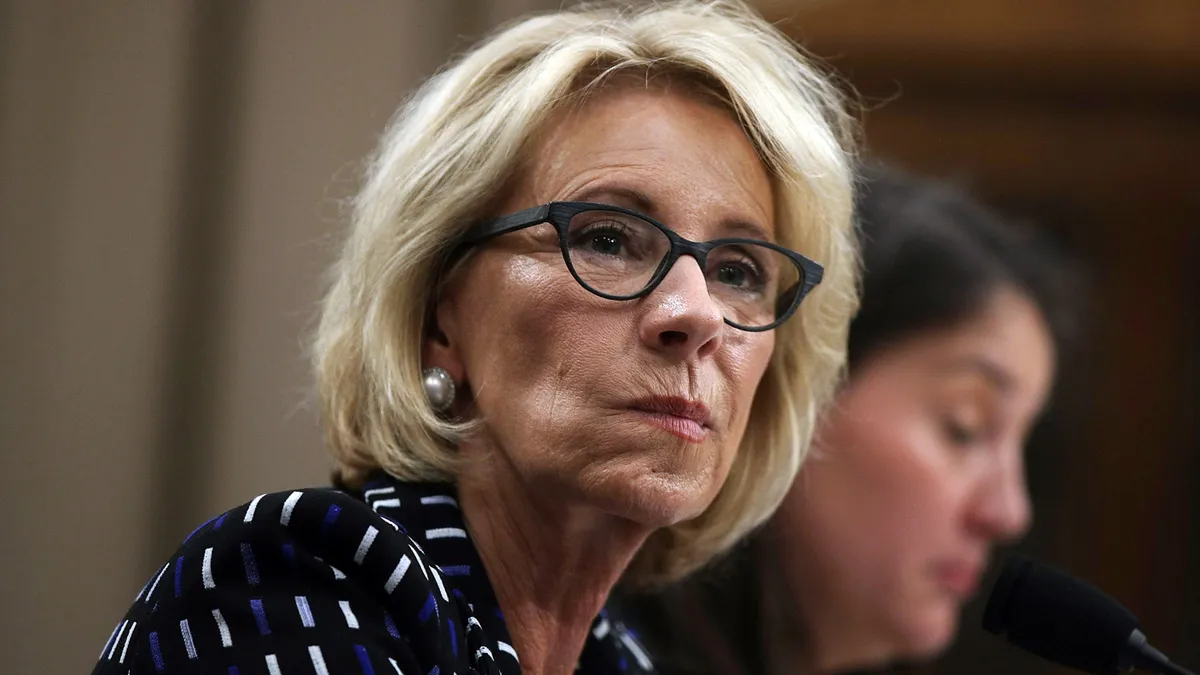Dive Brief:
- The U.S. Education Department has launched an investigation into eight colleges connected to an alleged nationwide admissions scheme to determine whether any broke laws or violated federal regulations, Politico reported.
- On Monday, the department sent letters about the investigation to the heads of the colleges, which include Stanford University, the University of Southern California and Georgetown University. They must demonstrate they have the proper procedures in place in order to give federal aid to students.
- The universities also must inform the department of any knowledge they have that a university employee or representative violated laws pertaining to federal student aid programs. The agency can cut off an institution's access to aid or impose other penalties if it finds evidence it substantially misrepresented their educational offerings, Politico notes.
Dive Insight:
The Ed Department's investigation into the eight colleges is just the latest fallout over the bribery scandal, in which dozens of wealthy parents allegedly paid millions to secure spots for their children at elite institutions.
Since the Justice Department revealed the scheme to the public, students have filed a class-action lawsuit against the involved universities that alleges the admissions process at those institutions was "warped and rigged by fraud" and that they wouldn't have applied if they had known about the conspiracy.
At least one university, Yale, has rescinded the admission of a student linked to the scheme, while the University of Southern California (USC) has prevented some students from registering for classes while it conducts an investigation. The scandal has also prompted some elite universities to take a closer look at whether their athletics admissions process (a pathway that in this case was exploited) are in need of reform.
"Universities need to fortify their admissions process," Dan Prywes, a partner at Morris, Manning & Martin, told Education Dive earlier this month. "They need to start thinking like a bank, where every stage of the payment process is monitored and there are internal controls."
It's still unclear what the extent of the ramifications will be for the scandal-hit colleges. For USC, in particular, the bribery scheme caps off a string of recent scandals that have plagued the university. Eyes will be on USC's new president, former University of North Carolina at Chapel Hill Chancellor Carol Folt, to see if she can successfully guide it into recovery.
But crisis-management experts say all institutions, regardless of whether they're implicated in the scandal, should reexamine their policies and assure prospective students they will get a fair shake during the admissions process. They should also should be prepared to answer questions about which students get offers and why.
Alia Wong, a staff writer for The Atlantic, points out that applicants from wealthy families have long had the upper hand during the admissions process because they've had access to at-times expensive college preparatory resources and sports programs to differentiate their applications. And in some cases, families have made big donations to the schools where their children are applying.
In response to legislation announced in the wake of the scandal that would remove tax benefits for donations made to colleges where a family member is applying, the National Association of College and University Business Officers (NACUBO) issued a statement that suggests those donations can be an important source of revenue for some colleges. NACUBO wrote they are "fundamental" to college's health and that the proposed legislation would "threaten to curb charitable giving."
Several efforts have sprung up in recent years to create a more equitable admissions process. The Coalition for College, for example, aims to make college prep resources more accessible to students from all backgrounds. And the College Board's Environmental Context Dashboard attempts to help colleges take into account applicants' educational advantages and disadvantages when reviewing them for admission.











